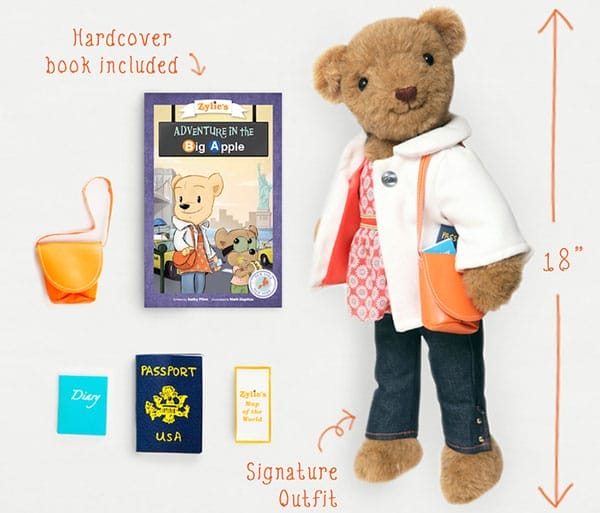When it came time for Mary Beth Minton, WG ’82, to introduce herself at our monthly Wharton Alumni Fairchester Business Development Group a few years ago, she reached down into her tote bag and pulled out a stuffed bear. The bear was irresistible—18 inches high with moving joints, wearing carefully sewn clothes and carrying a bag.
We had just met Zylie the Bear. Minton was starting on an entrepreneurial journey to produce and sell Zylie, along with a book describing Zylie’s adventures as she traveled the world.
Then Minton pulled a panda bear out of her bag. Zylie was going to meet Shen the Panda on a trip to China. Shen was sporting a leather jacket and had a backpack.
I was totally enchanted and entranced.
Minton went on to explain that she was on a mission to unplug children’s play. For 20 years, she had been trying different ways to convince other parents to cut down their kids’ screen time. She finally realized hectoring wouldn’t work and instead put all that energy into creating a business to accomplish her personal goal. From observing her own children , she realized that some kids like to play with dolls and others like stuffed animals. She decided to design a stuffed bear that could move like a doll and wear doll clothes. Like the American Girl dolls, the bear would come with a complete character and storybook.
Minton not only understands business from her Wharton education and a career in banking. She can also sew. She created her own prototype, worked with a puppet designer to get the bear’s face looking just right, then set out to find an overseas manufacturer and shipping agent. She bootstrapped the entire enterprise with the goal of selling the toys through retailers.
I recently had a chance to catch up with Minton and hear about her latest experiences in building this entrepreneurial venture. When starting out, Minton talked to Wharton Entrepreneurship, and they told her, “You can have the best toy, but if no one knows about it, no one will buy it.”
“We underestimated how hard it is to market,” Minton told me. “Most entrepreneurs make this mistake. Most are very creative. That’s the fun part. I talk to a lot of startups, and most business owners don’t know where their customers are coming from. You have to give your customers attention. You have to convince the buyers for stores to take your toy. But the customers have to want to buy it off the shelf.”
She believes 90 percent of starting a business should be focused on marketing.
Yet Minton did not have $20 million to buy ads on TV; her son, Matt McCarty, said they should use social media. He left his job in marketing in Denver, moved east and helped his mother market the teddy bears. Social media has played a huge role in connecting with an audience and building awareness and demand for the bears.
“We have an avid fan base on Instagram of close to 10,000 (mostly kids) with very high engagement,” said Minton, adding that the toy’s Facebook page has 5,300 fans.
Watch Mary Beth Minton’s TEDx talk, “Unplug to Play: Letting Kids Be Kids.”
Getting the word out has not been the only challenge. The company also needed to work with a consultant to navigate the safety testing.
“Taken together all the challenges of starting a business can seem daunting,” said Minton. “But once you start figuring things out, it becomes doable. It’s amazing how it all comes together.” The company has had five-fold year-over-year growth in sales, and the number of units sold is over 10,000. Minton has also given a TEDx Talk and has been invited to participate in a Women Business Leader Roundtable at the White House.
Zylie and Shen have become so popular that fans are clamoring for the next bear in the lineup, Kiki the Koala. Minton and McCarty have just embarked on a Kickstarter Campaign to raise $125,000 to fund the production of the new toy.
Asked how they came up with the Kickstarter goal, Minton explained that $125,000 will cover the costs of producing the minimum order, safety testing, inland freight in China, container shipping costs from China to the U.S., inland freight in the U.S., shipping costs to the end consumer and other operating costs for the five months from the end of the Kickstarter to final shipment.
Add to those costs the time commitment. It took three months for Minton and McCarty to set up the Kickstarter campaign. They had to shoot a video and lay the groundwork for all the marketing and publicity to generate awareness and interest. They did prerelease publicity. Again, Minton found that it’s up to the founders of a company to do the legwork when it comes to publicity and promotion.
Even if they do not reach their funding goal (at last count, Kiki’s campaign had 65 hours to go), the Kickstarter campaign has raised awareness of Zylie and her friends.
Zylie the Bear is looking for a new friend—hence, the Kiki the Koala Kickstarter.
“We’ve engaged with mommy bloggers and with members of the press. We’ve used Pinterest to share craft ideas for parents to do with their kids. And a popular YouTube family with 1.2 million daily viewers loves Zylie and Shen,” said Minton. All this has been great for sales and staying in touch with customers.
“Ultimately, the child has to ask for the toy,” she noted. “We have to connect with the children.”
Connecting with customers is every entrepreneur’s goal. It looks like Mary Beth Minton has been doing very well connecting with hers.

























